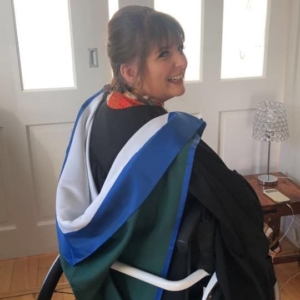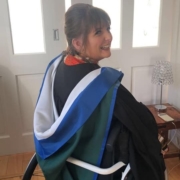An article by Jessica Burke
I believe research is the perfect way to educate and create awareness of cerebral palsy and its relation with psychological health. As a young adult with CP, conducting research in the field of psychology and providing insights that have important implications for intervention, paediatrics, teaching and clinical practice is not only significantly important but very exciting and powerful. it gives me a voice and hopefully a voice for others with cerebral Palsy.
 My experience of living with Spastic quadriplegic Cerebral Palsy and the impact it had on my psychological wellbeing was the reason I decided to study psychology and the neuroscientific mechanics of the brain in an effort to devote myself to research in particularly investigating psychological health of adults with CP. It took me quite a while to open up to my lectures my goal of wanting to devote myself to research in cp and psychological health. The research was so limited, and still is and nobody ever talked about mental health and Cerebral Palsy. During my undergraduate in psychology the lecturers would discuss different mental health disorders like schizophrenia or depression for example and I was always very occupied sitting at the back of the class pondering how this may relate to cp and making associations between CP and mental health challenges. I then went on to study clinical neuroscience as I was particularly interested in gaining an understanding into the anatomy and physiology of the human brain and body with these too being significantly important in understanding cerebral palsy. It was here I wanted to translate what I leant in the different modules such as neuroanatomy, neurophysiology and neuropsychiatry to name a few to how it may relate to CP physically, psychology and socially. I then went on to study an MA in psychology where I conducted my first major research project on adults with cerebral palsy. I enjoyed every second of conducting the research. I was suddenly connected with people with CP, experts and caregivers who all wanted the same thing of creating more research in mental health an CP. It was a fantastic experience. It also became evident that through all my studies that lecturers and classmates had very little knowledge of CP let alone how it is related with mental health. I felt relieved talking about as I think they were all learning something too.
My experience of living with Spastic quadriplegic Cerebral Palsy and the impact it had on my psychological wellbeing was the reason I decided to study psychology and the neuroscientific mechanics of the brain in an effort to devote myself to research in particularly investigating psychological health of adults with CP. It took me quite a while to open up to my lectures my goal of wanting to devote myself to research in cp and psychological health. The research was so limited, and still is and nobody ever talked about mental health and Cerebral Palsy. During my undergraduate in psychology the lecturers would discuss different mental health disorders like schizophrenia or depression for example and I was always very occupied sitting at the back of the class pondering how this may relate to cp and making associations between CP and mental health challenges. I then went on to study clinical neuroscience as I was particularly interested in gaining an understanding into the anatomy and physiology of the human brain and body with these too being significantly important in understanding cerebral palsy. It was here I wanted to translate what I leant in the different modules such as neuroanatomy, neurophysiology and neuropsychiatry to name a few to how it may relate to CP physically, psychology and socially. I then went on to study an MA in psychology where I conducted my first major research project on adults with cerebral palsy. I enjoyed every second of conducting the research. I was suddenly connected with people with CP, experts and caregivers who all wanted the same thing of creating more research in mental health an CP. It was a fantastic experience. It also became evident that through all my studies that lecturers and classmates had very little knowledge of CP let alone how it is related with mental health. I felt relieved talking about as I think they were all learning something too.
I love my position of being both a researcher in psychology and neuroscience and a young adult with CP. You have something more than those who studied CP at medical school, a deeper understanding that you would never learn from any textbook. It is crazy getting to work with experts in CP and make decisions from a medical perspective. Growing up with cp your looking up to the team of experts and relying on them to make the best decision for you and for your future. In my early years of my studies the goal seemed so far away its surreal to have gotten this far and achieved the qualifications I wanted, nevertheless my goals are endless, but that’s what gives me strength. I am only somewhere at the beginning. I will continue to contribute to the literature in psychology, neuroscience and Cerebral Palsy and hopefully create an easier future for those who are born and grow up with the condition. For those who are going through such difficulties or already have I hope with my research they can start to find order and meaning in their experience and know that their not alone and can find an ability to reconstruct the strong, defeatless, worthy person they are. I hope others with Cerebral Palsy can too feel inspired and empowered to make their mark in the world because Cerebral Palsy is so important in teaching the world.



